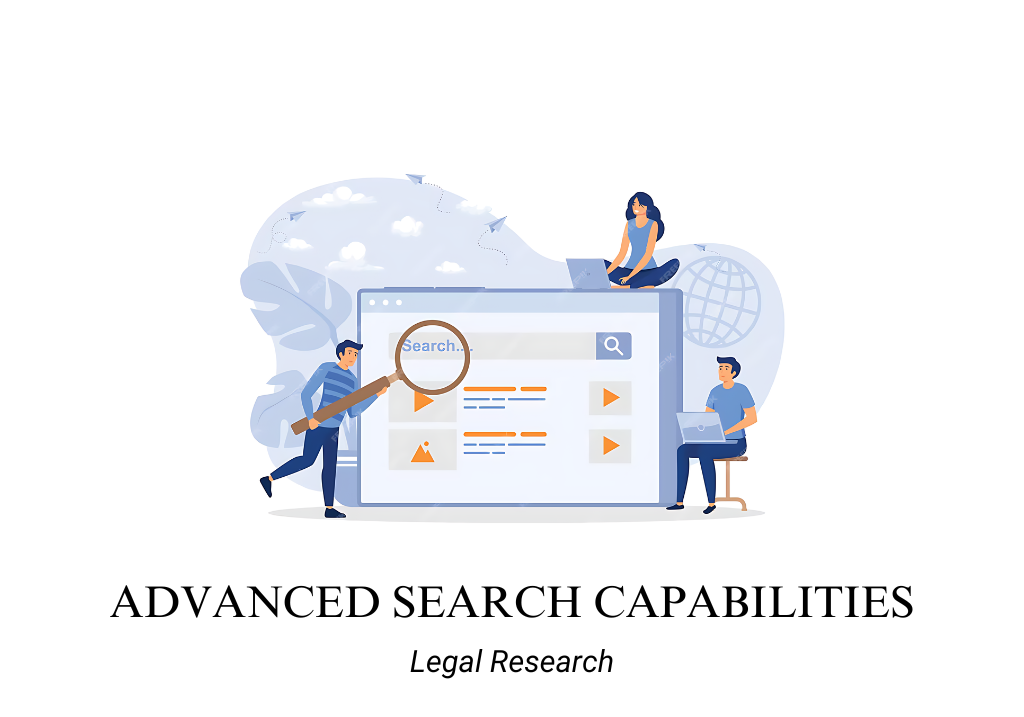Introduction
Meaning
Advanced search capabilities refer to a suite of sophisticated search tools and functionalities that enable legal professionals to efficiently locate relevant information within vast collections of legal documents, databases, and digital repositories. This functionality includes various search methods such as Boolean and logical operators, AI-powered search algorithms, and document upload features to ensure comprehensive and precise retrieval of relevant legal information and documents.
Purpose
The purpose of advanced search capabilities is to enhance the efficiency and accuracy of legal research by allowing users to perform targeted and refined searches across multiple data sources. This functionality helps legal professionals quickly find the most relevant information, streamline their research process, and ensure they have access to all necessary documents and data to support their legal arguments or advise clients effectively.
Benefits
- Increased Research Efficiency: Advanced search tools save time by enabling users to quickly locate pertinent information without manually sifting through irrelevant documents.
- Enhanced Accuracy and Precision: Boolean and logical search operators allow for highly specific queries, ensuring that search results are relevant to the user’s needs.
- Comprehensive Coverage: AI-powered search and document upload features ensure that all relevant information, including nuances and context, is captured during the search process.
- Improved Accessibility: Allows users to search across multiple databases and document types, providing a one-stop solution for comprehensive legal research.
- Reduced Research Costs: By streamlining the search process and improving accuracy, advanced search capabilities can reduce the time and cost associated with legal research.
CHECK MORE: Guide to find best Legal Research Tools
Features
Search Functionality
- Meaning: Search functionality refers to the basic ability to query and retrieve information from legal databases and digital repositories. This includes a user-friendly interface for entering search terms and accessing search results, often with options for sorting, filtering, and refining results based on various criteria.
- Purpose: The purpose of search functionality is to provide a straightforward and accessible way for users to find relevant legal information quickly. This feature helps legal professionals locate necessary documents, cases, statutes, or other legal materials efficiently, supporting their research and case preparation.
- Use Cases:
- General Legal Research: A law student uses the search functionality to find relevant case law and statutes for a research paper on constitutional law.
- Case Preparation: An attorney preparing for a trial uses search functionality to locate precedent-setting cases and legal opinions to support their arguments.
Boolean and Logical Search
- Meaning: Boolean and logical search features allow users to perform complex searches using logical operators (such as AND, OR, NOT) and modifiers (such as proximity, wildcard, and exact phrase searching). This enables users to create highly specific search queries that can filter out irrelevant information and focus on the most pertinent results.
- Purpose: The purpose of Boolean and logical search is to provide users with powerful tools for refining and narrowing their search queries. This functionality helps legal professionals conduct targeted searches, ensuring that they find the most relevant documents and information quickly and accurately.
- Use Cases:
- Narrowing Search Results: A researcher uses Boolean operators to filter search results for a specific legal issue, combining multiple keywords and excluding unrelated topics.
- Complex Legal Queries: An attorney conducts a search using proximity operators to find cases where two specific legal terms appear within a certain distance of each other, helping to locate more relevant precedents.
AI-Powered Search and Chat
- Meaning: AI-powered search and chat features leverage artificial intelligence and natural language processing (NLP) to enhance search capabilities. This technology allows users to enter search queries in plain language and receive relevant results based on context and intent, rather than just matching keywords. AI-powered chat functionality can also provide interactive, conversational assistance, guiding users to refine their searches and discover relevant information more intuitively.
- Purpose: The purpose of AI-powered search and chat is to make legal research more intuitive and accessible by understanding the user’s intent and context. This functionality helps users discover relevant documents and information more naturally and efficiently, even if they are not familiar with specific legal terminology or search techniques.
- Use Cases:
- Natural Language Queries: A paralegal uses AI-powered search to find case law related to a client’s issue by simply typing a question in plain language, such as “What are the recent rulings on non-compete agreements in California?”
- Interactive Research Guidance: An attorney uses the AI-powered chat feature to refine their search queries based on initial results, receiving suggestions and guidance on narrowing or expanding the search scope for more precise results.
Document Upload
- Meaning: Document upload features allow users to upload legal documents (such as pleadings, briefs, contracts, or case files) to the search platform. The system analyzes the uploaded documents using AI and NLP technologies to extract relevant information, keywords, and context, providing related case law, statutes, or secondary sources based on the content of the document.
- Purpose: The purpose of the document upload feature is to facilitate more personalized and context-specific research by leveraging the content of the user’s own documents. This functionality helps users find relevant legal information more efficiently by providing search results that are directly related to the specific issues and content of their uploaded documents.
- Use Cases:
- Contextual Legal Research: A lawyer uploads a draft brief to the search platform, which analyzes the document and provides a list of relevant cases and statutes that could strengthen the legal arguments in the brief.
- Contract Review: A corporate attorney uploads a contract to identify any legal precedents or regulatory issues that might affect its enforceability or require revisions.
Conclusion
These advanced search capabilities significantly enhance the legal research process by providing precise, efficient, and comprehensive tools for locating relevant information. By leveraging these features, legal professionals can perform more effective research, develop stronger legal arguments, and better serve their clients with up-to-date and accurate legal knowledge.
CHECK OUT LEGAL RESEARCH TOOLS ON DIRECTORY OR CLICK HERE


